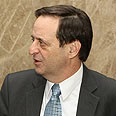

Israel on Tuesday played down the prospect of an imminent attack on Iran, saying its arch-foe's controversial nuclear program could still be set back by sanctions and sabotage.
Six world powers are expected to renew efforts next month to talk Tehran into curbing its uranium enrichment, which can yield fuel for atomic warheads as well as for civilian projects. Iran denies having any hostile designs.
Related stories:
- Iran presents battlefield contingencies
- Obama: Time for diplomatic resolution is short
- Report: Israeli soldiers scour Iran for nukes
Israel, widely believed to have an atomic arsenal, sees a mortal threat in a nuclear-armed Iran. It has caused international concern, and worried oil markets, by hinting it could resort to military strikes if it deems diplomacy, including mounting global sanctions, to be at a dead end.
Moshe Yaalon, a senior deputy to Israeli Prime Minister Benjamin Netanyahu, said the mid-April talks would show "if there is a chance that the sanctions are working or that the Iranians are continuing to maneuver and advance toward a military nuclear capability".
But asked during an interview with Israel's Army Radio if this meant the Netanyahu government might be just weeks away from launching a war against Iran, Yaalon demurred.
"No. Look, we have to see," he said. "The (Iranian nuclear) project is not static - whether that means progress, or sometimes, retreat. All sorts of things are happening there."
"Sometimes there are explosions, sometimes there are worms there, viruses, all kinds of things like that," Yaalon said, suggesting that setbacks plaguing Iran over the past three years, including the assassination of several of its scientists and the Stuxnet malware that stymied core computer systems, could be repeated.
Iran accused Israel of involvement in the past sabotage. Israel has not responded directly to the allegation, though it says it coordinates many of its efforts to tackle Tehran's atomic ambitions with Western and regional allies.
Netanyahu demanded, during a Washington visit this month, that any diplomatic deal with Iran end its uranium enrichment and remove its stockpiles of the fuel. Iran has ruled that out.
Netanyahu bluffing?
Speculation about a looming Israeli-Iran conflict has also raised the question of whether Netanyahu is bluffing in a bid to intensify pressure on Tehran by a war-wary Washington.
Many independent experts, and the senior US military officer, General Martin Dempsey, have voiced doubt about Israel's ability to deliver lasting damage to Iran's distant, dispersed, and well-defended facilities.
Asked on Army Radio if Israel had decided to strike Iran, Yaalon said: "Even if it had, I would not share that with you."
Another Netanyahu deputy, Dan Meridor, said he opposed discussing the military option in public because this inadvertently shored Iran up against sanctions.
"What it helps do, to my regret, is to raise the price of oil, and this compensates for the decline in Iran's oil production," Meridor told Israeli television on Saturday.
- Receive Ynetnews updates
directly to your desktop















